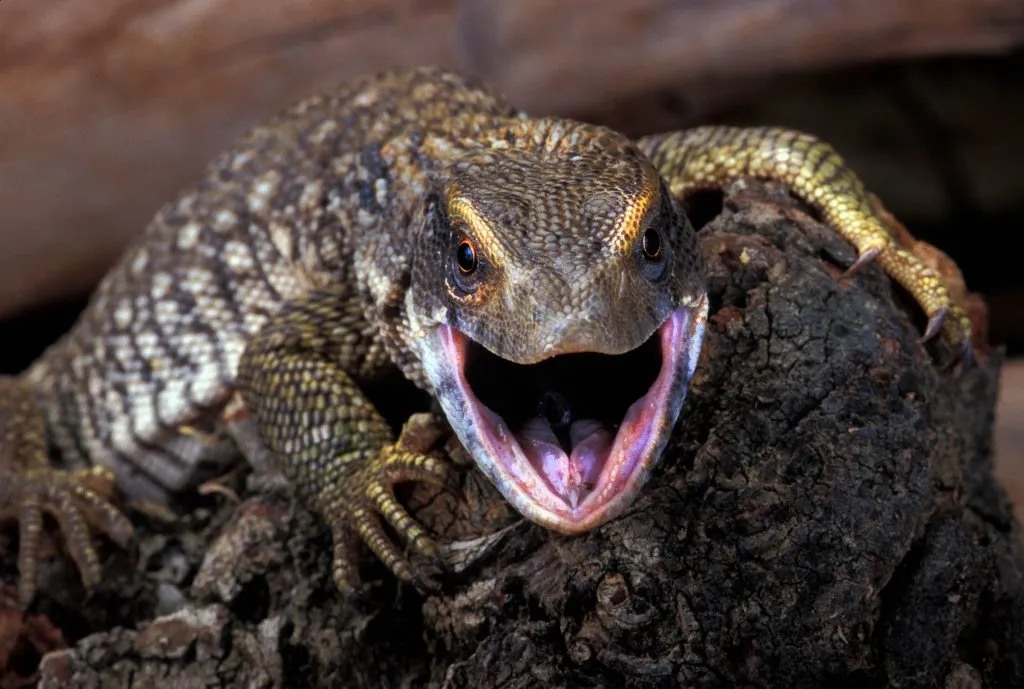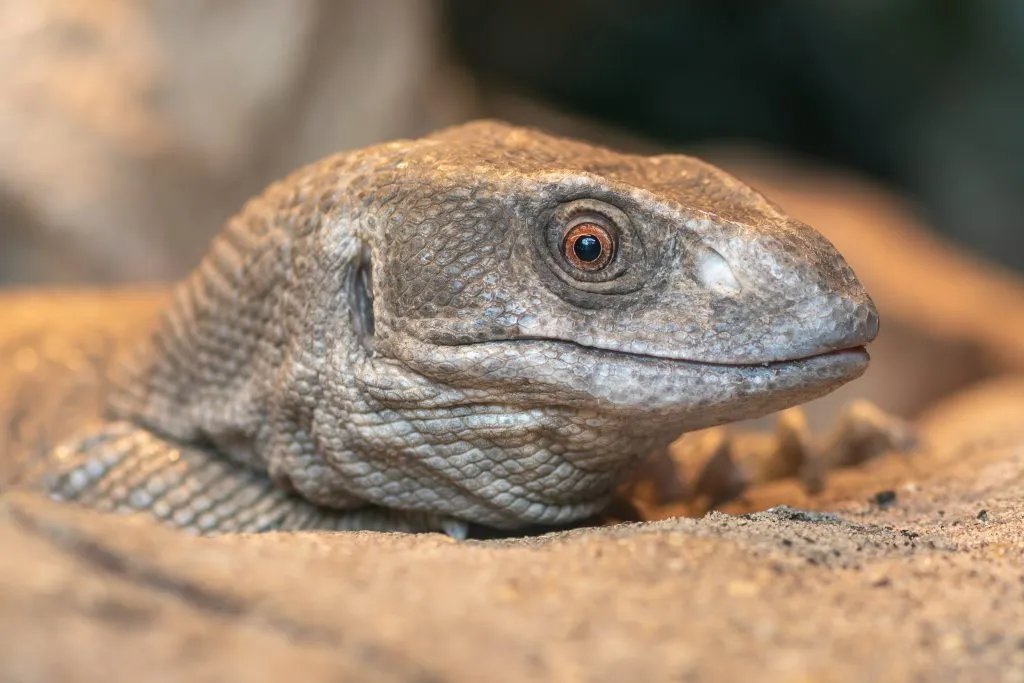
Do Savannah monitors bite constantly? You may have heard horror stories of people getting nasty bites from their Savannah monitors, but are their bites really that bad? In the event that you get bit, what will happen and how should you treat the bite?
Savannah monitors have a bite force of 10.7 psi however this cannot be felt entirely as their teeth are small. Their sharp but small teeth were made to grip as opposed to ripping. They tend to do curiosity bites, but serious bites happen when they feel threatened.
It can be scary to tame your Savannah monitor especially if it can deliver a nasty bite, but as you read this article you will find out that handling training it despite the bite risks will help lessen the biting instances. So read on for more tips!
Table of Contents
Why Do Savannah Monitors Bite?
Savannah monitors do not bite just for the heck of it. Keep in mind that they are natural predators and scavengers.
Even if you have a captive-bred Savannah monitor, their instinct to constantly push boundaries is deeply ingrained in their genes.
Baby and juvenile Savannah monitors can be feisty. They can bite everything around them simply due to curiosity.
This is why it is important to tame and do handling training early so that they do not become too defensive as adults.
Tip: Learn more about caring for savannah monitors in our guide here!
They can also deliver a bite when a part of your body smells like their
Lastly, if they are already stressed and you forcefully handle them, they will definitely bite.
Do Savannah Monitor Bites Hurt?
Savannah monitors have a bite force of 10.7 psi which is higher than that of a snake’s bite, but lower compared to the bite force psi of a cat or a dog.
If this is the case, why are so many people scared of a Savannah monitor’s bite?
The bite per se is not as painful as it is surprising. As the teeth of Savannah monitors are small but sharp, the initial bite may just leave an indentation to the skin or slight punctures to the skin (it depends on the size of your Savannah monitor).
However, the scary part is that their bites are meant to grip onto something. If they decide to not let go of the grip, then this bite can become serious.
One wrong move on your part can easily tear your flesh.
Much worse, if your Savannah monitor decides to thrash its head from side to side, it can easily inflict serious damage that stretches further than the initial bite area.
What Happens If A Savannah Monitor Bites You?

It may put some pressure on you to know that what happens next after your Savannah monitor bites you, solely depends on your reaction.
This is the reason why breeders and owners urge those who got bitten to not scream or even flinch.
We discussed earlier that Savannah monitors may not choose to let go of their bite grip. We do not want this to happen.
Therefore, we should not react in a way that can be perceived as threatening so that our Savannah monitors will not push through with the bite.
Are Savannah Monitor Bites Venomous?
Contrary to popular belief, the bite of a Savannah monitor is not venomous.
Scientists and researchers are actually divided on this when it comes to bites from the Varanus family. However, as scientists kept testing Savannah monitors and their potential to deliver venom from their bites, they found no trace of it.
This study shows that the Savannah monitors differ from their distant monitor cousins.
There are cases where people have allergic reactions to the bite of their Savannah monitors, while others do not feel anything different after the bite.
Still, it pays to exercise caution when you are taming and handling your Savannah monitor.
How To Treat A Savannah Monitor Lizard Bite?
If you are lucky and your Savannah monitor lets go of the bite area immediately after the bite, here are things that you can do:
- Calmly place your Savannah monitor back in its enclosure.
- Examine the bite area. If the skin was not punctured, then you can simply disinfect the area with alcohol or clean it with water and soap.
- If the bite broke the skin but did not pierce it deeply, rinse the wound under running water. Pat the area dry and apply betadine and Terramycin. Observe the wound to see if it is healing and if it is, just keep cleaning it and applying ointment.
- If the bite was able to pierce deep into the flesh. Rinse it first with running water and apply betadine. Cover it with a breathable cloth and go to a doctor.
In the event that your Savannah monitor really went through with the bite and was able to rip flesh, here is what you can do:
- As much as you want to get to tending to the bite, the interaction between you and your Savannah monitor should not end on a negative note, as this will reinforce the idea to your monitor that you are submitting to its “bite.” So muster enough courage to put it back in its enclosure as calmly as possible.
- It may be painful, but you have to rinse the open wound under running water.
- Do not put anything on the wound. Just cover it gently with a breathable cloth.
- Immediately go to the doctor as you may need stitches and antibiotics.
How To Prevent Your Savannah Monitor From Biting

There is no easy way around taming your Savannah monitor and getting it to a point where it is less likely to bite. In fact, even tame Savannah monitors manage to sneak in a little bite from time to time.
The secret is trust bonding and handling training early on. It is best to start taming your Savannah monitor when it is still a baby.
It has to learn that you are not a threat but at the same time, you are not submissive towards its defensive behaviors.
Of course, as with handling training, there is a risk that you will constantly get bitten. So it is better to come prepared with protective gear.
It may take a long time, several months even, but eventually, you will see that your Savannah monitor will not become defensive toward you.
Tip: If you need a step-by-step guide on how to tame your Savannah monitor, this article will be perfect for you.
Final Thoughts
The bite of a Savannah monitor can be nasty, especially if it does not let go of the bite area.
However, what is important is your reaction to the bite, which will determine the next thing that your Savannah monitor will do after the initial bite.
It is vital to not aggravate your already defensive Savannah monitor. Try to be as calm as possible, even if it hurts. Do not shout or try to pull away your monitor, as you risk ripping your flesh.
If the bite is serious, immediately go to your doctor as you may need stitches, or you may have an allergic reaction to its saliva.
- Enchi Ball Python: A Unique and Stunning Morph of Python regius - March 27, 2025
- Emerald Tree Monitor: The Enigmatic Green Guardian of the Rainforest - March 26, 2025
- The Egyptian Cobra (Naja haje): A Fascinating Serpent - March 25, 2025
